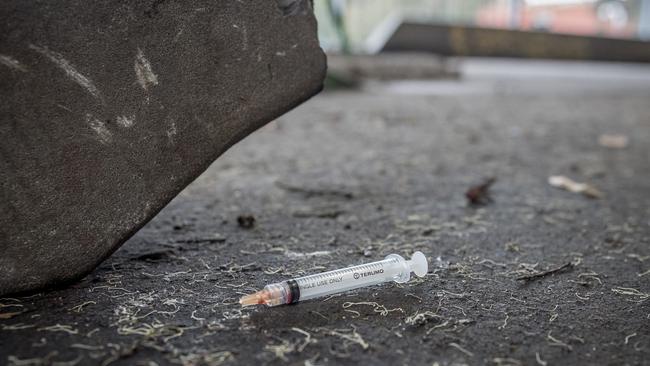Richmond safe injecting room: Needle exchange staff cuts could lead to HIV spike
Community workers responsible for providing clean needles for drug users have had their hours slashed by a third and claim the drastic cuts will lead to needle sharing and a spike in the spread of disease.

Melbourne City
Don't miss out on the headlines from Melbourne City. Followed categories will be added to My News.
City needle exchange workers who have had their hours slashed by a third warn the drastic cuts will lead to needle sharing and a spike in the spread of disease.
Cohealth’s innerspace service hours will be reduced from seven nights a week to just three, with staff hours cut by 36 per cent.
The community health organisation is responsible for providing safe injecting equipment to drug users to reduce the spread of HIV, hepatitis C and other bloodborne viruses.
The team pick up containers full of used syringes, provide fresh containers to users and ensure safe disposal around the city including Collingwood, Richmond and Fitzroy areas.
A cohealth innerspace community health worker at who asked to remain anonymous told The Melbourne City News the cuts would “almost certainly lead to greatly increased needle sharing among drug users”.
“Services for injecting drug users will be severely restricted … currently we deliver needles seven nights of the week to people in the community who need them,” they said.
“We are in the middle of a public health crisis as is, the last thing we need is the spread of hepatitis C and HIV while trying to combat COVID-19.”
Last year the need for the specialist staff increased when they were asked to help the supervised safe injecting room in Richmond after a round of cuts.
The innerspace team is made up of two thirds casual staff who were promised contracts early this year after making multiple requests to convert to permanent employment.
The Australian Services Union (ASU) said they were told the cuts were due to the excess use of casuals which caused a budget deficit.
“Management at cohealth has been aware of the overuse of casual staff for several years. At various points in the last two to three years,” the statement read.
In a document sent to staff and seen by The Melbourne City News, casual workers were told promises to make them permanent employees wouldn’t be honoured and cuts were made to keep up with a “contraction of government funding.”
Staff said the cuts were much bigger than required and asked to see detailed financial information.
The request was denied.
To increase funding cohealth says it has submitted more than 11 grants to local, state and federal government, but that funding was usually given to start new programs rather than boost existing ones.
In June cohealth welcomed news it had been selected as the preferred location for a second medically supervised injecting facility in Melbourne saying, it was “extremely well placed to deliver this type of service.”
Cohealth is looking to reduce harm reduction staff while they pursue the contract for the second injecting room site.
A cohealth spokesperson said the cuts to drug support staff hours would cause “minor” changes only.
“Cohealth is continuing to consult with union representatives regarding a change management proposal,” they said.
“If implemented, this proposal would result in some minor changes to service hours and rosters.”
The ASU will continue with union discussions as part of a consultation process with cohealth.
MORE MELBOURNE CITY NEWS
ACCUSED RAPIST CHARGED FOR 1996 ATTACK
‘NO REMORSE’: SAFE INJECTING ROOM HEROIN TRAFFICKER APPEALS
WHY COUNCIL CANDIDATE WON’T BACK MARKET SAFE INJECTING ROOM
Check out more stories at The Melbourne City News
Like us on Facebook here
Contact Grace at grace.mckinnon@news.com.au
